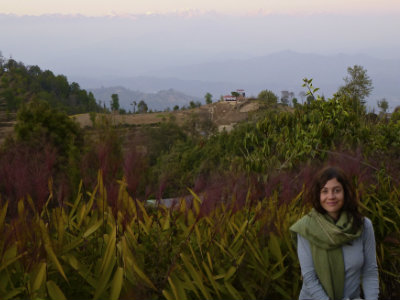
My journey into social work began seven years ago and like so many social workers I began it because I loved working with people. First as a carer for older people and eventually qualifying and working as a social worker with children and families.
I ended up working in a deprived area of North London. And slowly but surely my initial enthusiasm and energy was sapped by the all too familiar problems of heavy case loads, long hours, too much time in front of a computer and not enough spent with the children I was trying to help.
With never-ending exhaustion also came the awareness that I was becoming more and more disconnected from the families I was working with. This scared me and I decided I couldn’t keep going. It was time for a change.
I had always thought that social work would be a good qualification for working abroad and in fact had intended to work overseas after qualifying. But of course that first job comes along and five years later I was still in London.
Nepal was a country I had first travelled to when I was 20 and I fell in love with the beauty of the country and its people. It was somewhere I kept gravitating back to for holidays – trekking and rafting- and I had enjoyed getting to know the people, their culture, landscape and food.
So when I decided it was time to finally do what I had promised myself and move abroad, Nepal seemed like an obvious choice.
I’ve never been one for planning ahead and so with just a handful of useful contacts and little more than my backpack to accompany me I suddenly found myself with a one-way ticket to Kathmandu.
Nepal’s people exude a warmth that I’ve never experienced elsewhere, but life is hard here, especially for women. Poverty is the root cause of so many problems – human trafficking, suicide, lack of education, mental health issues, drug misuse, exploitation and abuse. As a social worker these issues were familiar to me so I hoped that my social work skills could be put to good use.
I now work with a number of organisations doing invaluable work with Nepal’s most vulnerable. One rescues trafficked children from corrupt orphanages and reintegrates some of them back to their families; another works to rehabilitate women rescued from sex trafficking and the third works with street children.
I have volunteered some of my time and social work skills to these excellent organisations. The work has included creating and teaching a curriculum to educate teenage girls about puberty, sexual health and gender violence; developing tools such as risk and family assessments; updating child protection policies and working with local social workers in the field to develop their skillset.
But in turn I feel I have benefited massively from the people I have met here.
These young people and families have faced unimaginable trauma and loss; for some these experiences have been profoundly damaging, but many seem to have found a resilience and determination to carry on that amazes me. Maybe it’s because in Nepal people have to – there is no safety net.
It’s also their willingness to share their experiences and use them to educate others that I really admire and feel inspired by. Seeing all of this has reminded me why I came into this profession in the first place.
It’s taught me greater patience and empathy and proven that my social work skills really are transferable.
Most importantly though it has reignited the enthusiasm I used to have for helping people that had gotten lost somewhere down the line in the UK.
Monday: “It’s just social work in a different way.” Lizzie Lake talks about her experiences starting up her own business in Nepal.


 Bournemouth, Christchurch and Poole
Bournemouth, Christchurch and Poole  Hampshire County Council
Hampshire County Council  Lincolnshire County Council
Lincolnshire County Council  Norfolk County Council
Norfolk County Council  Northamptonshire Children’s Trust
Northamptonshire Children’s Trust  South Gloucestershire Council
South Gloucestershire Council  Wiltshire Council
Wiltshire Council  Wokingham Borough Council
Wokingham Borough Council  Children and young people with SEND are ‘valued and prioritised’ in Wiltshire, find inspectors
Children and young people with SEND are ‘valued and prioritised’ in Wiltshire, find inspectors  How specialist refugee teams benefit young people and social workers
How specialist refugee teams benefit young people and social workers  Podcast: returning to social work after becoming a first-time parent
Podcast: returning to social work after becoming a first-time parent  Podcast: would you work for an inadequate-rated service?
Podcast: would you work for an inadequate-rated service?  Family help: one local authority’s experience of the model
Family help: one local authority’s experience of the model  Workforce Insights – showcasing a selection of the sector’s top recruiters
Workforce Insights – showcasing a selection of the sector’s top recruiters 

 Facebook
Facebook X
X LinkedIn
LinkedIn Instagram
Instagram
Comments are closed.